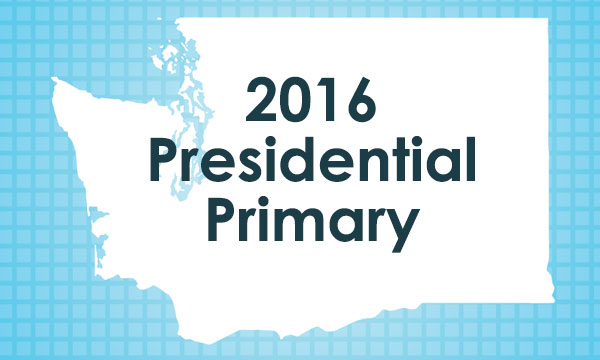Presidential caucuses/primary: `WA voters will have a voice’
With the Iowa caucuses behind us, and the New Hampshire primary coming up Tuesday, you might be wondering how Washington’s presidential nomination process works — and with good reason! Rather than just a caucus or a primary, the Evergreen State will hold both, with each playing a different role in each party’s nomination process.
So how will it all work?
Our state’s May 24 presidential primary will operate much like a general election – with one big exception. Voters will have to sign a party declaration and vote only on one party’s list of candidates. Voter’s Pamphlets and ballots will go out the first week in May, and voters will have 18 days to mail back or use a ballot dropbox.
Unlike our state’s presidential primary, caucuses are run entirely by the political parties. This year’s Republican caucuses will take place Saturday, February 20, while the Democratic caucuses will be held on Saturday, March 26. Voters are welcome to attend either a Democratic or Republican precinct caucus, declare themselves a member of that party, and work with their fellow caucus-goers on platform planks and electing delegates to later conventions.
For Democrats, a tally is taken of each candidate’s support, and delegates are awarded roughly proportionately, leading to legislative district caucuses and county conventions, the state convention, and finally, the national party nominating conventions.
Washington’s Republican Party also will allocate their delegates proportionally, based instead on the primary results. In previous years, the GOP has allocated half of the national convention delegates through the caucus process and half through the presidential primary. This year, the party will still hold caucuses, primarily to help develop platform planks and resolutions, and to elect delegates to district, congressional and state convention.
The Republican Party will award 41 national delegates through our state presidential primary. Eleven are at-large, awarded proportionately based on statewide results to candidates garnering more than 20% of the vote. Each of Washington’s 10 congressional districts will award three delegates based on district results. Any single candidate receiving a majority or more than 20% of the vote in a congressional district will win all three delegates. However, if no candidate garners more than 20%, or if three or more candidates garner more than 20%, those three delegates are divided among the top three voted candidates. If only two candidates breach the 20% mark, the most voted candidate receives two delegates, with the other candidate receiving the remaining delegate.
The Democrats will not be using the primary results.
Secretary of State Kim Wyman is urging voters to go to their caucuses and to cast presidential primary ballots as well.
“I am delighted that Washington voters will have a voice in the presidential primary/caucus season,” she said. “There has been a very high level of voter interest in the 2016 presidential race and news coverage has been pretty much 24-7.
“I am particularly enthused by the presidential primary, which will be a broadly based election, accessible, convenient and secure. Voters will be getting a Voter’s Pamphlet and there will be good information from the campaigns and the parties. I imagine we will be seeing some of the candidates here as the caucuses and primary draw closer.”
